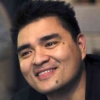Jose Antonio Vargas

Jose Antonio Vargas
Jose Antonio Vargasis a journalist, filmmaker, and immigration rights activist. Born in the Philippines and raised in the United States from the age of twelve, he was part of The Washington Post team that won the Pulitzer Prize for Breaking News Reporting in 2008 for coverage of the Virginia Tech shooting online and in print. Vargas also has worked for the San Francisco Chronicle, the Philadelphia Daily News, and The Huffington Post. He wrote, produced, and directed the autobiographical 2013...
NationalityFilipino
ProfessionJournalist
Date of Birth3 February 1981